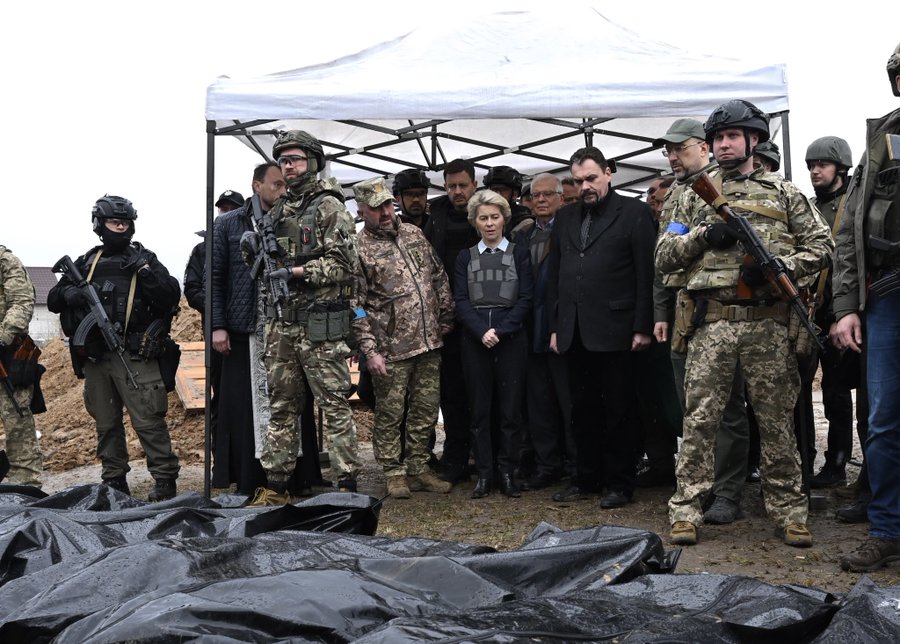The European Commission announced on Wednesday a number of measures to support independent investigations of war crimes committed against the civilian population in Ukraine.
A Commission spokesperson said that justice Commissioner Dieder Reynders has sent a letter to the justice ministers in the EU member states with a call for coordination at political level. The Commissioner asked them to assist with a list of requests he has received from the Ukrainian Prosecutor General.
This includes, for instance, the provision of investigators to document war crimes; experts with forensic expertise; equipment for the secure storage of evidence, secure lines of communication and on-the-job training for investigators.
The European Union Advisory Mission (EUAM), which was in Ukraine before the war and has returned now, will also be tasked to cooperate with the Ukrainian General Prosecutor to ensure investigation and collection of evidence on the ground.
The Commission has also started working on a proposal to amend the regulation on the European Union Agency for Criminal Justice Cooperation (Eurojust) to give it the legal possibility to collect and store evidence on war crimes, such as audio and video recordings. The existing regulation did not foresee crimes of this scale. A proposal is expected the coming days.
A Joint Investigation Team has been set up with Ukraine to collect evidence and investigate war crimes. The team will cooperate with the International Criminal Court. The work is ongoing and the Commission is are supporting Ukraine with experts and equipment. A French team of forensic experts is already on the ground.
The International Criminal Court announced already days after Russia’s invasion of Ukraine that it immediately would open an investigation into possible war crimes committed in Ukraine, following requests by its member states.
Finally, the Commission is supporting the investigations financially through funding for equipment, experts or the work of the genocide network which has started to train judicial authorities for building cases on war crimes. The EU is also launching a dedicated €7.5 million project to support large data collection on missing and disappeared persons.
The European Network for investigation and prosecution of genocide, crimes against humanity and war crimes (‘Genocide Network’) was established in 2002 by the European Council to enable close cooperation between the national authorities when investigating and prosecuting these crimes. The network’s mandate is to ensure that perpetrators do not attain impunity within the member states.
“One thing is clear: there can be no impunity. Those responsible for atrocities and war crimes in Ukraine must be held accountable and we’ll do everything possible towards this goal,” the Commission spokesperson said.
Kremlin and its spokespersons have rejected the accusations of war crimes committed by Russian troops in Ukrainian cities and dismissed them as “provocations” and “fake news” by Ukraine. In fact, they have been corroborated by eye witnesses and satellite images from the time when the cities were occupied by Russian troops.
The recent appointment of general Dvornikov as supreme commander of the Russian troops in Ukraine is ominous considering that he served in the wars in Chechnya and Syria where Russia indiscriminately bombed civilian targets. US intelligence warns about an escalation of the hostilities in eastern and southern Ukraine and a “scorched-earth” policy by the Russian troops.
As already reported, US President Joe Biden has called Russia’s war in Ukraine “genocide” and accused its President Vladimir Putin of attempting to “wipe out the idea of even being Ukrainian.”
The allegations of “genocide” were first raised by Russia when it accused Ukraine of “genocide” in Donbass to justify its invasion. Russia and its ideologues also motivated the unprovoked invasion of Ukraine, which suffered immensely during WWII, under the pretext of “de-nazifying” the country and denying the existence of a Ukrainian nation with the right to an independent country.
There were no international conventions against genocide on the eve of WWII and governments were “free” to commit mass atrocities against their own populations. Only retroactively were crimes against humanity – defined as war crimes committed on a vast scale against civilians – included in the statutes of the Nuremberg trials. The Nuremberg judgment in October 1946 made no mention of genocide.
Only in 1948, did the United Nations adopt the convention on the prevention and punishment of the crime of genocide. Genocide is defined as killing and other acts committed with the intent to destroy, in whole or in part, a national, ethnical, racial or religious group.
In a twist of history, the two lawyers, Raphael Lemkin and Hersch Lauterpacht, who first proposed the legal terms “genocide” respectively “crimes against humanity”, studied in Lviv, or as it was called then Lemberg, in western Ukraine (see East West Street/Retour a Lemberg, by professor Philippe Sands).
The existence of international laws against mass killings of civilians might not prevent atrocities but at least they raise awareness of the crimes and send a signal to the perpetrators that they will be punished. The non-existence of any legislation in the past made it easier for by-standers not to believe that such crimes could take place.
M. Apelblat
The Brussels Times

